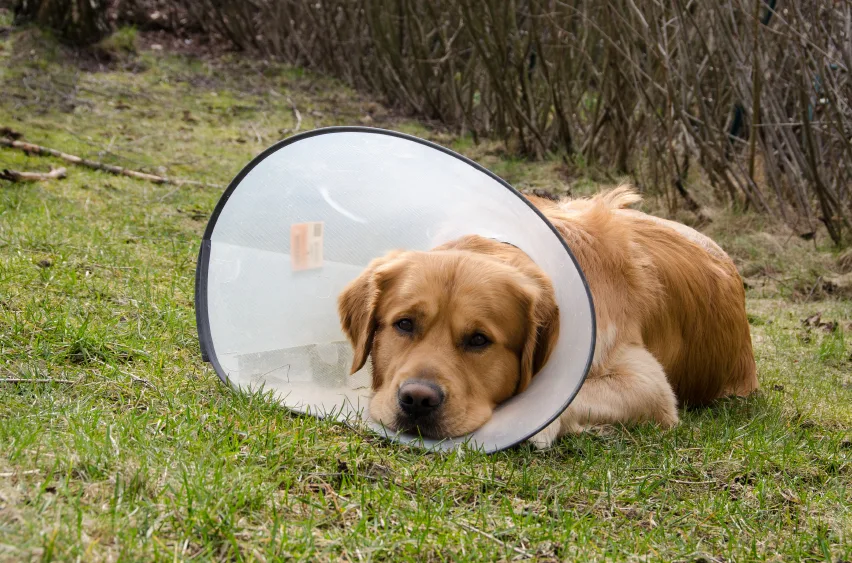The organism known as candida albicans exists naturally not only in the human body, but in the bodies of our canine companions as well. Good intestinal health will keep the balance of candida and other organisms in check. Unfortunately, if something throws off that natural balance, the ratio of candida to good bacteria can run askew. When that happens, a fungal infection develops.
What Causes Candidiasis in Dogs?
The body’s (yes, that means you and your dog) normal immune system combined with “good” bacteria is usually enough to keep candida levels under control. Candida has the unique distinction of being considered both a yeast and a fungus.
One of the most common reasons for this balance being altered is the use of antibiotics. This phenomena is very similar to the way a human might react to taking antibiotics.
Other common causes are steroids, sudden environmental changes, changes to the diet (especially if it it has too much sugar), and even stress. Chemotherapy and other medications can also cause a candida overgrowth. Living in a very warm or humid environment is another very common trigger for this type of infection – especially in the skin.
Signs & Symptoms
You may not immediately realize that your dog has a candida infection. Symptoms can mimic other conditions and it isn’t entirely uncommon for misdiagnosis to occur without a skin scrape and testing. Dogs with diabetes are more likely to develop fungal urinary tract infections.
As for the symptoms, they can be vague even when they occur. You may see your dog struggling to urinate. He may also show signs of joint pain and fatigue or complete lethargy. Seek immediate medical attention if you notice these symptoms.
Most dogs experience a fungal skin issue now and again. They are more likely to develop rashes in the warmer, moist areas of the body, such as near the eyes, around the ears, inside skin folds, and around the anal area.
Some dogs may also develop rashes from other causes. The subsequent itching, scratching, and open hot spots will develop a secondary fungal infection.
Skin issues aren’t the only symptoms, though. Dogs with candidiasis may also present with, among other symptoms:
- Unusually smelly bowel movements.
- Unusually bad breath (worse than normal dog breath).
- Noticeable constipation.
- Rashes or discoloration of the skin.
- Itchy paws (look for chewing and picking).
- Itchy or watery eyes (with or without discharge).
- Discharge coming from the ears.
- Noticeable joint pain (despite not having an injury).
Diagnosis
You’ll definitely want to see your vet for a formal diagnosis. Treating a fungal skin infection like any other rash could ultimately make it worse and will just leave your dog feeling itchy and miserable. Most vets can make a visual diagnosis by the way the skin oozes or flakes, but they may also take skin scrapings to view under a microscope. It’s a very simple test that your vet can usually look at right in the office.
Treatment of Canine Candida Yeast Infections
Treatment varies depending on the symptoms. Many dogs respond well to topical treatments. These include anti-yeast shampoos, topical ointments, or medicated wipes you can use to regularly clean the area.
Oral medications can also be prescribed, but they are expensive to purchase over-the-counter for canines. The most common drug is Fluconazole, also used in humans. It is a very effective medication, when used properly.
You may opt to try topical treatments first if the infection does not seem severe. If it is bad, you may need to treat topically and orally together to give your pup relief.
Natural treatments can also be very helpful and effective. Most vets will recommend you make sure your dog’s diet is balanced and healthy, with low-carb foods that are free of starches to minimize exposure to the sugars yeast loves. A holistic vet may also help you dose coconut oil to help treat and soothe the condition. Do not try coming up with the dose on your own as too much may give your dog diarrhea.
There are some herbal supplements that can help, specifically with the skin-related irritations. Horsetail, dandelion, and spirulina are just a few that can be combined to support skin and coat health. This is, again, something you should consult your vet about to ensure your dog gets the correct dose and will not have an interaction with any other treatments or foods.
Living, Management & Underlying Cause(s)
It is also important to determine if the candida infection has an underlying cause. Let’s say the infection was caused by antibiotic use. You will likely need to finish the antibiotic course to overcome the bacterial infection, continue treating the skin topically, and then talk to your vet about Fluconazole. Probiotics may help to balance your pup’s GI tract again.
Is it possible your dog is eating too much sugar? Make sure he’s getting a high-quality dog food made with natural ingredients. Cut back on the people food (especially sugary snacks).
Make sure visiting family members and friends aren’t slipping your pup too many extras. They mean well, but may also think sharing scraps is a way to bond with your dog.
That said, there are some indications that sudden candidiasis may be a sign of a different or more severe condition. For example, the condition is correlated with the onset of Diabetes. Ask your vet to check your pup’s bloodwork, especially if he’s also been drinking more water or acting fatigued. You may need to change his diet, start oral meds, or implement a new insulin medication routine to keep your dog’s condition under control, which would then keep the candida in check as well.
There’s nothing fun about a canine candida infection, just as there is nothing fun about any of the human variations. The difference is that your dog is depending on you to make sure he gets proper medical attention and treatment as soon as possible. Consult your vet as soon as you start to notice any odd medical symptoms in your dog. Fungal infections are often easier to treat in the early stages than they are when they’ve been raging for a week or more. The sooner you seek advice and a formal diagnosis, the happier you and your pup will be!

